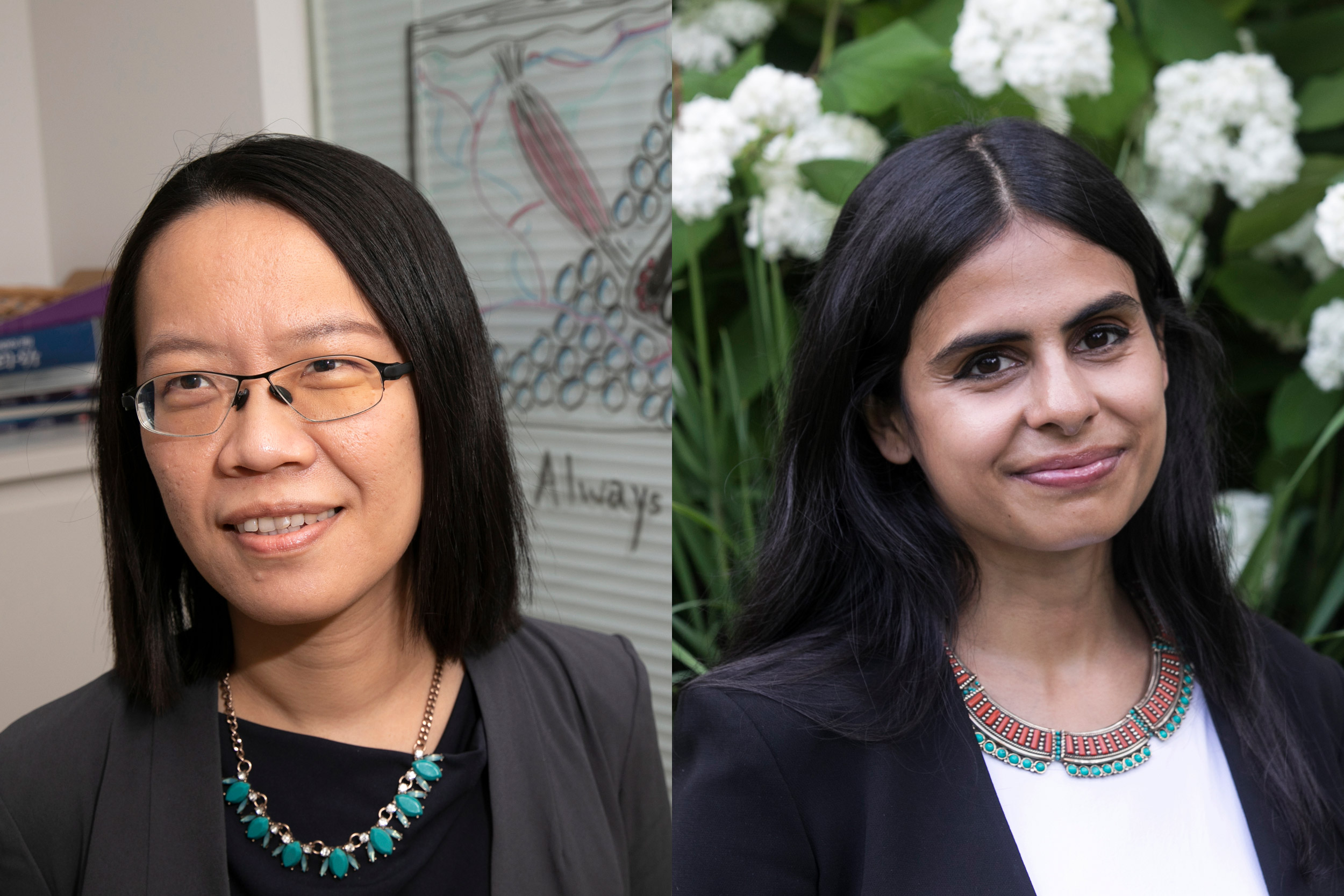
Ya-Chieh Hsu (left) and Durba Mitra are Abramson winners.
Photos by Jon Chase/Harvard Staff Photographer
Two receive Roslyn Abramson Award
Ya-Chieh Hsu and Durba Mitra recognized for excellence in teaching undergraduates
Ya-Chieh Hsu and Durba Mitra have been named this year’s winners of the Roslyn Abramson Award, given annually to assistant or associate professors for excellence in teaching undergraduates.
“I am delighted that Ya-Chieh Hsu and Durba Mitra are receiving this well-deserved recognition,” said Claudine Gay, Edgerley Family Dean of the Faculty of Arts and Science. “They are both deeply passionate about our teaching mission, and have demonstrated creativity, care, and real intellectual engagement in how they connect with students, both in and out of the classroom.”
Hsu, the Alvin and Esta Star Associate Professor of Stem Cell and Regenerative Biology, said the award is meaningful to her because she takes so much pride in her teaching.
“Every year I try to challenge myself to teach some new lectures that are not directly related to my own expertise, but in an area that I felt important and really wanted to learn together with my students,” she said. “It is always fun and difficult at the same time. The news came when I was in the middle of preparing such a lecture, so it really felt like an encouragement.”
Hsu is currently teaching “From Cells to Tissues, in Sickness and in Health,” a course that blends concepts from cell, developmental, and stem-cell biology. It begins by exploring the cellular and molecular processes involved in building tissue and concludes with lectures focused on exploring how diseases such as cancer arise when these systems fail.
“This is an exciting area in which lots of important progress has been made, so the course is always evolving,” she said. “However, one thing we always focus on since the inception of the course is critical thinking. Every lecture, through lots of discussions, I always put a priority on not only teaching the concepts but also engaging students to think critically about these concepts and principles: How were these discoveries made? What conclusions can you draw based on the evidence provided? What is correlation and what is causation? How can you apply these principles to solve problems?”
Mitra, an assistant professor of women, gender, and sexuality and the Carol K. Pforzheimer Assistant Professor at the Radcliffe Institute, is proud to have been selected for the award. But she is also excited about teaching three new courses this year, including “Global Feminisms,” which is part of the College’s newly revamped General Education program.
“The course explores movements for sexual rights and feminist thought in historical and global perspective, using everything from music videos to political posters to diverse archives of memoirs, short stories, and scholarly books by international women, women of color, and queer and trans people,” she said.
In addition, Mitra looks forward to offering “Solidarity: Transnational Women’s Rights from Suffrage to NGOs” in collaboration with the Schlesinger Library’s Long 19th Amendment Project, which focuses on the complex lives and politics of women in transnational perspective. Mitra will also be teaching “The Sexual Life of Colonialism,” a class that will examine marginalized sexual minorities, queer and same-sex sexualities, and race and sexuality in the colonial and decolonizing world.
“These histories are vital and changing every day in our present, 50 years after the Stonewall Uprising here in the U.S., and in a moment today where people are organizing against gendered harassment and inequality, and laws against homosexuality are being challenged all over the world.”
The Abramson awards were formally announced at a faculty meeting in May, with each recipient being awarded $10,000. The prize was established with a gift from Edward Abramson ’57 in honor of his mother. The recipients are chosen each year based on their accessibility, dedication to teaching and research, and ability to effectively communicate with and inspire undergraduates.
Hsu says that the funding will help ensure that the work her students do in the lab will continue to flourish. “We constantly have undergraduates working with us during the academic year and summertime. The funds will provide the necessary resources to support their research projects and put what they learn in the course to practice.”
Mitra plans to use the stipend to continue research on her upcoming book, which explores Third World feminist political thought during the second half of the 20th century. “I’m going to travel to many different archives and homes across South Asia, East and North Africa, and Southeast Asia to build alliances with scholars and activists, preserve endangered collections of women leaders, and research key organizations that produced novel ideas of sexual rights.”




